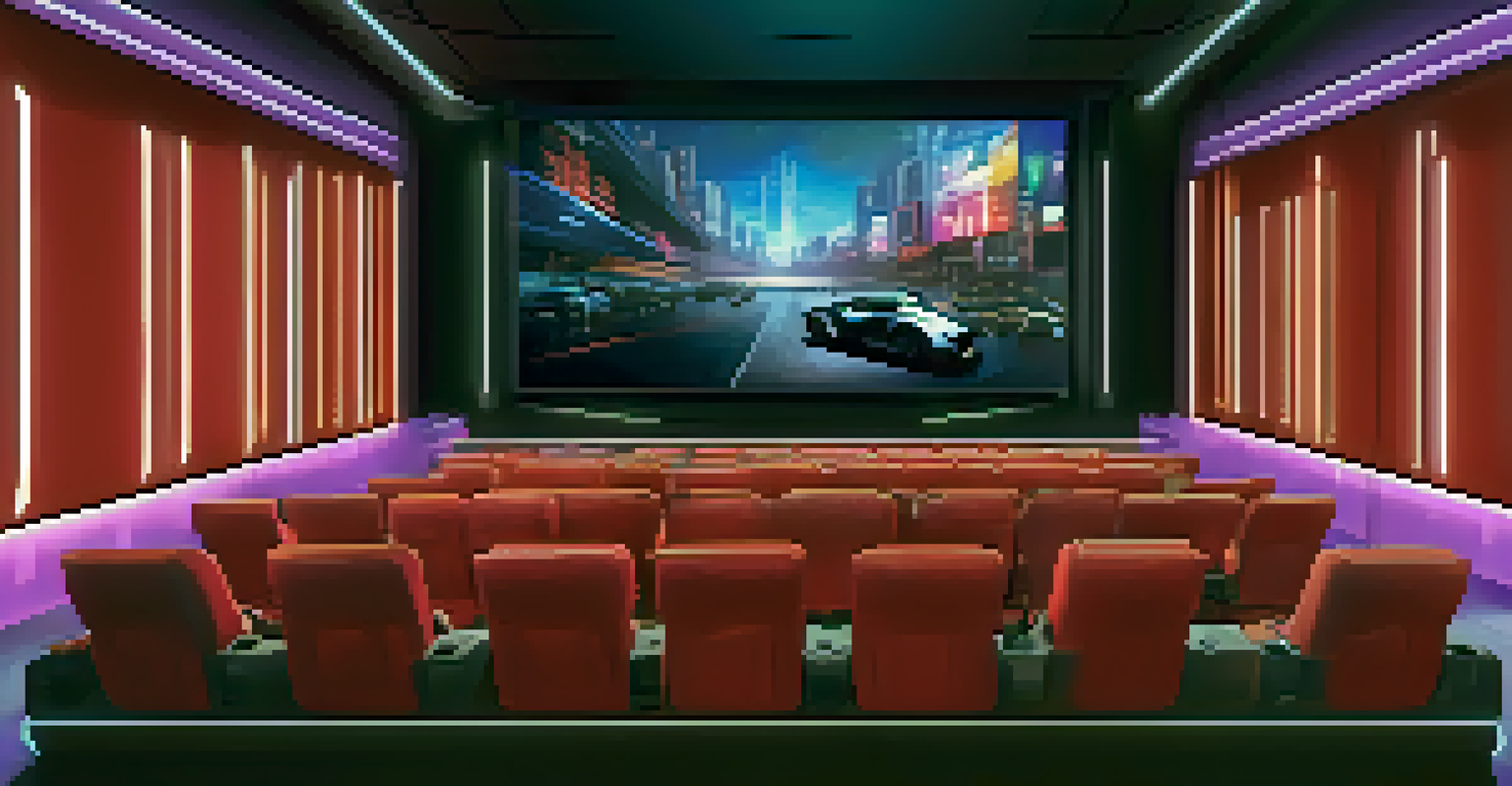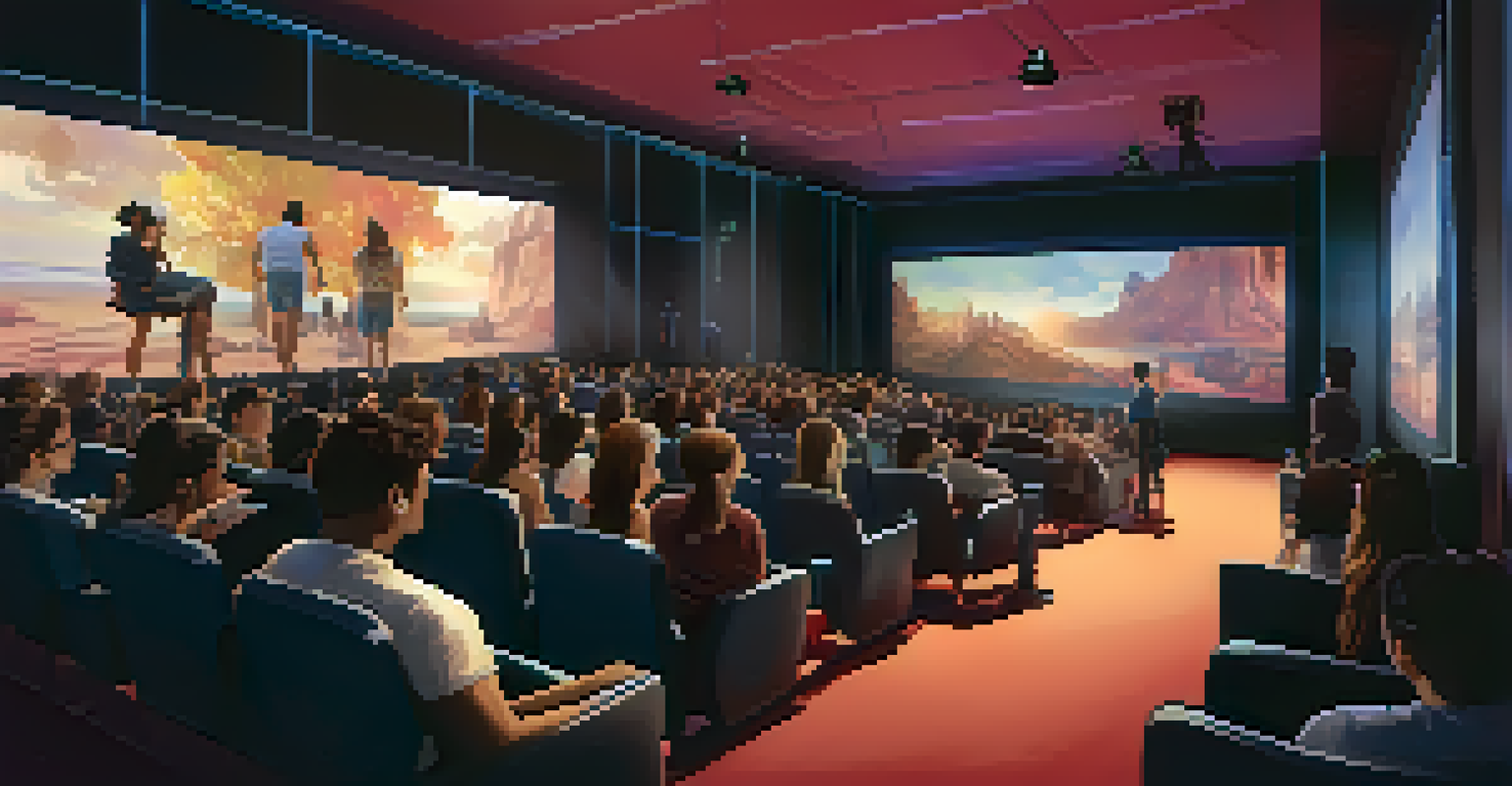Audience Reception and Genre Evolution in Modern Cinema

Understanding Audience Reception in Film
Audience reception is crucial in determining a film's success. It refers to how viewers interpret and react to a movie, influenced by their personal experiences and cultural backgrounds. For instance, a romantic comedy may resonate differently with a young audience compared to older viewers, as life stages shape our perceptions.
Film is a mirror that reflects the world and its complexities.
The advent of social media has transformed audience reception, allowing viewers to share their opinions instantly. Platforms like Twitter and Instagram enable real-time feedback, which can influence box office performance and even the trajectory of sequels. This immediate interaction fosters a sense of community, as fans rally around shared views or debates.
Ultimately, understanding audience reception helps filmmakers tailor their narratives and marketing strategies. By analyzing viewer feedback, creators can refine their storytelling techniques, ensuring they resonate with diverse audiences. This dynamic relationship between film and viewer shapes the evolving landscape of modern cinema.
The Role of Genre in Audience Expectations
Genres serve as a framework for audiences to set their expectations before watching a film. Whether it's horror, comedy, or action, each genre comes with its own set of conventions and tropes that audiences have come to recognize. For instance, viewers anticipate jump scares in horror films, while comedies often rely on witty dialogue and situational mishaps.

However, filmmakers often play with these genre expectations to surprise and engage audiences. By subverting traditional genre elements, they can create fresh experiences. A great example is Jordan Peele’s 'Get Out,' which blends horror with social commentary, challenging viewers to rethink what they expect from both genres.
Audience Reception Shapes Film Success
Understanding how viewers interpret and react to films is vital for filmmakers to connect with diverse audiences.
This interplay between genre and audience expectations highlights the importance of innovation in filmmaking. As genres evolve, they can become hybridized, leading to new subgenres that appeal to modern viewers. This evolution ensures that cinema remains relevant, engaging, and exciting.
The Impact of Cultural Shifts on Genre Evolution
Cultural shifts significantly influence the evolution of film genres. As societal norms and values change, so do the themes explored in cinema. For example, the rise of feminist movements has led to stronger female protagonists in action films, as seen in movies like 'Wonder Woman' and 'Mad Max: Fury Road.'
Cinema is a matter of what's in the frame and what's out of it.
These cultural changes not only affect the characters portrayed but also the narratives themselves. Films are increasingly reflecting contemporary issues, such as mental health, diversity, and climate change. By addressing these topics, filmmakers resonate with audiences who seek authenticity and relevance in storytelling.
As a result, genres are continually reshaped to reflect the zeitgeist, creating cinema that is both entertaining and thought-provoking. This responsiveness to cultural shifts ensures that film remains a mirror to society, fostering dialogue and understanding.
Technological Advancements and Genre Innovation
Technological advancements have played a pivotal role in the evolution of film genres. Innovations such as CGI, virtual reality, and improved sound design have expanded the possibilities of storytelling. For instance, the fantasy genre has flourished with the help of CGI, allowing filmmakers to create stunning visual worlds that captivate audiences.
Moreover, technology has democratized filmmaking, enabling more diverse voices to enter the industry. Independent filmmakers now have access to affordable tools, leading to the emergence of unconventional genres. Films like 'The Blair Witch Project' showcase how low-budget creativity can redefine genre boundaries.
Cultural Shifts Influence Genre Themes
As societal norms evolve, films increasingly reflect contemporary issues, reshaping genres to resonate with modern audiences.
As technology continues to evolve, so too will the genres we know and love. This ongoing innovation not only enhances the viewer experience but also challenges filmmakers to push the envelope, resulting in fresh narratives and styles that keep audiences engaged.
The Influence of Globalization on Film Genres
Globalization has significantly affected the landscape of modern cinema, leading to the blending of genres across cultures. Films from different countries are now more accessible than ever, allowing audiences to experience diverse storytelling styles. For example, Bollywood musicals have influenced Hollywood, leading to colorful dance sequences in mainstream films.
This cross-cultural exchange enriches the genre landscape, creating hybrid genres that appeal to a global audience. Movies like 'Parasite' and 'Roma' showcase how different cultural perspectives can resonate universally while still retaining unique elements from their origins.
As globalization continues to shape cinema, filmmakers are encouraged to explore themes and styles from various cultures. This trend not only broadens the scope of storytelling but also fosters international dialogue, making cinema a truly global art form.
Audience Engagement Through Interactive Cinema
Interactive cinema is an emerging trend that enhances audience engagement by allowing viewers to influence the narrative. Platforms like Netflix have experimented with interactive films, such as 'Bandersnatch,' where choices lead to different story outcomes. This innovative approach transforms passive viewing into an active experience, making audiences feel more connected to the narrative.
By incorporating elements of choice, filmmakers can cater to diverse audience preferences, creating a personalized viewing experience. This shift not only keeps viewers engaged but also encourages repeat viewings as they explore different story paths.
Technology Drives Genre Innovation
Advancements in technology enable filmmakers to explore new storytelling methods, resulting in innovative narratives and genres.
As interactive cinema grows, it challenges traditional genre conventions and opens up new creative possibilities. Filmmakers must adapt their storytelling techniques to accommodate this format, leading to an exciting evolution in how stories are told.
The Future of Genre in Modern Cinema
Looking ahead, the future of genre in modern cinema is poised for exciting transformations. As audience tastes continue to evolve, filmmakers will likely experiment with new narrative structures and hybrid genres. This experimentation will keep the cinematic landscape fresh and relevant, appealing to a diverse range of viewers.
Additionally, advancements in technology and changing cultural dynamics will further influence genre evolution. Filmmakers will harness these tools to create innovative storytelling experiences that resonate with contemporary audiences, ensuring that cinema remains a vibrant art form.

Ultimately, the journey of genre evolution in modern cinema is a reflection of society itself. As audiences engage with films that reflect their realities and aspirations, the relationship between viewers and creators will continue to shape the future of storytelling in profound ways.